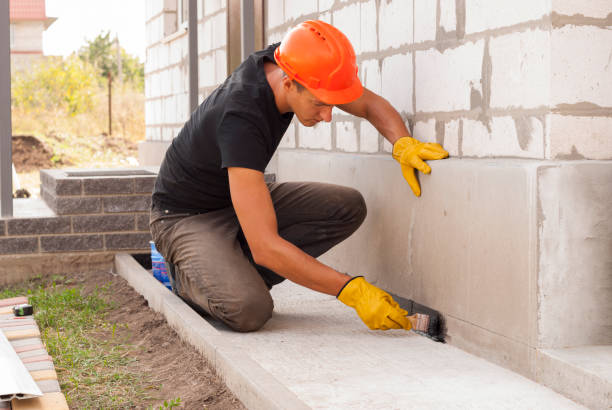
Understanding the Crucial Function of a Concrete Specialist in Modern Construction and Design
Concrete specialists are vital to the building and design industries. Their knowledge warranties that structures are not just sturdy however likewise visually pleasing. They engage in different responsibilities, from job planning to quality assurance, and work together with engineers and engineers. With evolving fads and technologies, their function is extra essential than ever. Comprehending their impact can disclose insights right into modern-day building techniques and the future of structure layout.
The Value of Concrete in Building and construction
Although different materials are employed in building and construction, concrete continues to be a keystone of contemporary structure techniques because of its toughness, adaptability, and strength. This composite product, made from concrete, water, and aggregates, can stand up to significant anxiety and is immune to fire, climate, and insects, making it perfect for varied applications. Concrete's versatility allows it to be built right into different shapes and dimensions, promoting innovative building designs.
Its thermal mass residential or commercial properties contribute to power performance, helping to manage indoor temperature levels. The widespread schedule of raw materials and the reasonably affordable of concrete also boost its charm for massive projects, from business buildings to facilities like roads and bridges. As urbanization proceeds to rise, the need for lasting and dependable structure materials solidifies concrete's vital function in building, making it a basic choice for building contractors and designers intending for durability and durability in their projects.
Key Responsibilities of a Concrete Service provider
Concrete service providers play a necessary role in the building procedure, with numerous key responsibilities that assure project success. Their jobs include project planning and style, product option and administration, in addition to maintaining top quality control and assurance throughout the job lifecycle. Recognizing these responsibilities is essential for appreciating the contractor's influence on building and construction outcomes.
Job Planning and Style
When starting on a building task, reliable project preparation and design play a necessary function in a concrete professional's duties. The contractor needs to work together closely with designers, clients, and engineers to comprehend the project's requirements and goals. This entails evaluating site problems, evaluating style needs, and determining the scope of work. A concrete specialist is likewise in charge of creating spending plans and timelines, making certain that all stages of the task align with overall goals. In addition, they need to anticipate possible challenges and create options to preserve project efficiency. By diligently intending and developing each element of the concrete job, the professional sets the foundation for successful implementation, guaranteeing structural integrity and adherence to safety and security requirements throughout the construction procedure.
Product Choice and Monitoring
Efficient material selection and management are important responsibilities for a concrete professional, as these choices directly impact the high quality and sturdiness of the final framework. Concrete specialists must review numerous materials, consisting of accumulations, admixtures, and reinforcement types, to assure they satisfy job specs and ecological conditions. They have to think about aspects such as resistance, strength, and workability to weathering. Furthermore, managing the supply chain is necessary, as timely shipment of materials can extremely influence job timelines. Contractors should preserve relationships with providers to secure top quality sources while likewise monitoring stock levels to stay clear of extras or scarcities. Ultimately, this cautious choice and monitoring of products add to the total success of building jobs and the durability of the structures built.
Quality Control and Assurance
Quality assurance and guarantee are vital in the building market, especially for concrete service providers tasked with supplying reputable and resilient frameworks. Concrete service providers must carry out extensive quality assurance procedures throughout the construction process, ensuring that all products satisfy defined standards and regulations (Concrete Contractor Near Me). This consists of checking the mixing, pouring, and healing processes to avoid issues and boost structural stability. Routine inspections are vital, allowing service providers to recognize and fix issues quickly. In addition, concrete specialists usually work together with engineers and designers to ensure that the end product straightens with design specs. By adhering to stringent quality control procedures, concrete specialists not only safeguard the durability of their job however likewise maintain the trust fund of customers and stakeholders in the building and construction market
Kinds Of Projects Taken Care Of by Concrete Specialists
Concrete contractors are typically associated with large-scale construction jobs, their know-how extends to a varied array of applications. These professionals are important to residential tasks, such as driveways, structures, and patios, guaranteeing longevity and aesthetic allure. In commercial construction, they contribute to the development of floorings, sidewalks, and architectural aspects that satisfy specific layout and safety and security standards.
Furthermore, concrete professionals are associated with framework projects, including roadways, bridges, and passages, where their abilities ensure architectural stability and long life. They also play an essential role in decorative concrete applications, such as stamped concrete and sleek surface areas, which improve the appearance of numerous spaces. Furthermore, their solutions expand to fix and maintenance work, dealing with issues like breaking or disintegration in existing frameworks. This flexibility emphasizes the crucial function concrete professionals play in both practical and ornamental elements of modern-day building and construction and layout.
Certifications and skills Called for
Concrete specialists should have a varied collection of abilities and certifications to effectively handle the variety of tasks they undertake. Proficiency in concrete blending, pouring, and ending up is important, as is a strong understanding of different kinds of concrete, including strengthened and decorative options. Understanding of building and construction strategies, blueprints, and project administration concepts is i thought about this important for effective execution.
Additionally, physical endurance and toughness are essential as a result of the demanding nature of the job. Professionals ought to additionally have strong problem-solving capabilities to address unpredicted difficulties throughout projects. Communication abilities are crucial for collaborating with clients, designers, and various other tradespeople.
In addition, acquiring relevant qualifications can enhance a professional's reliability and broaden their occupation chances. Constant education in brand-new methods and products maintains specialists affordable in a swiftly evolving sector. These qualifications and skills collectively enable concrete contractors to provide top quality outcomes successfully and properly.
The Duty of Concrete Service Providers in Security Compliance
Making certain safety compliance is a basic duty of concrete service providers, as they navigate the complexities of building websites. These specialists are entrusted with sticking to stringent safety laws and requirements, which are crucial for stopping crashes and ensuring the well-being of all site workers. TJ Concrete Contractor. Concrete specialists need to carry out extensive security strategies that include training workers on proper tools usage and safety protocols
In addition, they are liable for examining materials and work processes to recognize potential hazards. By performing routine security audits and threat analyses, concrete service providers can proactively address concerns before they intensify. In addition, they collaborate with other construction experts, such as engineers and task managers, to integrate precaution right into the overall task technique. Ultimately, the commitment of concrete specialists to safety and security conformity not only safeguards workers however also enhances project efficiency and top quality, reinforcing their necessary role in modern construction.
Trends and Innovations in Concrete Design
Recent advancements in concrete style have actually introduced an array of patterns and developments that focus on sustainability and looks. Lasting concrete solutions, attractive ending up strategies, and clever concrete technologies are improving the industry. These developments not only improve architectural honesty but also contribute to environmentally responsible building and construction techniques.
Sustainable Concrete Solutions
As the building and construction sector significantly focuses on sustainability, innovative concrete options are emerging to reduce environmental effect while improving efficiency. One famous trend is the usage of recycled products, such as crushed concrete and industrial by-products, which not only decreases waste but also boosts the concrete's buildings. Furthermore, innovations in admixtures, consisting of fly ash and slag, add to reduced carbon discharges throughout manufacturing. An additional considerable advancement entails the advancement of absorptive concrete, which allows water to move via and reduces runoff, minimizing flooding and groundwater exhaustion. Furthermore, the rise of carbon capture modern technologies in concrete manufacturing holds assurance for additional emissions reduction. These lasting concrete options exhibit the market's dedication to ecologically accountable building and construction techniques.

Ornamental Ending Up Techniques
A myriad of attractive finishing strategies have arised in concrete layout, transforming ordinary surface areas into visually striking aspects. Strategies such as stamping, discoloration, and brightening permit a large range of aesthetic opportunities, catering to varied layout choices. Stamped concrete mimics all-natural materials like stone and block, while staining introduces vibrant colors that boost the surface's charm. Polished concrete, understood for its streamlined surface, includes class to both domestic and industrial rooms. Furthermore, microtopping and overlay systems supply cutting-edge options for revitalizing existing concrete. These strategies not just improve the aesthetic characteristics yet additionally enhance resilience and upkeep. As trends advance, the integration of Full Report ornamental surfaces proceeds to play an important duty in modern-day building and construction, weding capability with artistic expression.

Smart Concrete Technologies
While standard concrete stays a staple in building and construction, the appearance of clever concrete technologies is revolutionizing the sector by incorporating innovative functions that enhance efficiency and sustainability. These innovations consist of self-healing concrete, which makes use of embedded germs that turn on upon fracturing, and sensor-equipped concrete that keeps track of architectural health and wellness in real-time. In addition, piezoelectric and thermochromic concrete can adapt to ecological adjustments and generate electrical energy, respectively. The implementation of recycled products and green ingredients additionally adds to minimizing the carbon footprint of concrete manufacturing. As these technologies proceed to evolve, they guarantee to enhance longevity, lower upkeep costs, and advertise greener building practices, making them crucial for future construction tasks. The function of concrete professionals is significantly considerable in using these improvements.
Regularly Asked Questions
What Aspects Influence Concrete Rates in Construction Jobs?
Concrete rates in building and construction tasks is influenced by material expenses, labor expenditures, project dimension, area, availability of sources, and market demand. Seasonal aspects and transport costs can additionally considerably impact the overall rates structure.
Exactly How Do Climate Condition Affect Concrete Work?
Weather condition problems considerably affect concrete work; severe temperatures, humidity, and precipitation can affect setting times, article source curing procedures, and total quality - Concrete Contractor in Dallas. Professionals should adapt their timetables and methods to reduce these ecological influences for successful job completion
What Is the Common Timeline for a Concrete Project?
A common concrete task timeline varies from a couple of days to numerous weeks. Elements influencing this duration include job dimension, intricacy, weather, and treating times, which jointly figure out the general conclusion routine.
Can Concrete Service Providers Help With Design Assessments?
Concrete specialists can indeed help with design consultations, providing beneficial insights on material option, architectural stability, and aesthetic choices, making sure that jobs meet both functional requirements and the customer's vision for the ended up item.
What Prevail False Impressions Regarding Concrete Sturdiness?
Typical mistaken beliefs concerning concrete toughness include the idea that it is invulnerable to harm which all kinds are similarly strong. Actually, elements like mix design, environmental problems, and maintenance considerably influence concrete's long-term efficiency.
They also play a pivotal role in decorative concrete applications, such as stamped concrete and refined surface areas, which enhance the aesthetic element of various areas. Proficiency in concrete blending, putting, and ending up is crucial, as is a solid understanding of numerous types of concrete, consisting of strengthened and attractive alternatives. One famous pattern is the usage of recycled materials, such as crushed concrete and industrial by-products, which not just lowers waste however likewise enhances the concrete's buildings. While conventional concrete remains a staple in building and construction, the development of clever concrete modern technologies is changing the market by incorporating advanced attributes that improve efficiency and sustainability. These technologies consist of self-healing concrete, which uses ingrained bacteria that trigger upon splitting, and sensor-equipped concrete that checks architectural health in real-time.